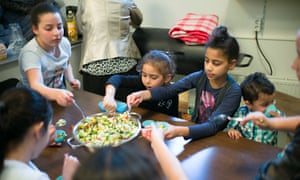
The city of Amsterdam is leading the world in ending the obesity epidemic, thanks to a radical and wide-reaching programme which is getting results even among the poorest communities that are hardest to reach.
Better known for tulips and bicycles, Amsterdam has the highest rate of obesity in the Netherlands, with a fifth of its children overweight and at risk of future health problems.
The programme appears to be succeeding by hitting multiple targets at the same time – from promoting tap water to after-school activities to the city refusing sponsorship to events that take money from Coca Cola or McDonalds.
It is led by a dynamic deputy mayor with the unanimous backing of the city’s politicians. From 2012 to 2015, the number of overweight and obese children has dropped by 12%. Even more impressive, Amsterdam has done what nobody else has managed, because the biggest fall has been amongst the lowest socio-economic groups.
It is in neighbourhoods like the Bijlmer in the south-east that the programme is changing lives. The Bijlmer is notorious, says Wilbert Sawat, coordinator and PE teacher at De Achtsprong primary school, and that’s why he wanted to work there. Other teachers do too, he says. “Here we can make a difference.”
The school is in the middle of a high-rise housing estate that was experimental in the 1960s, with raised roads so people would be free to walk and cycle on the ground level. But the cycle parks are empty. In 1975, when the Dutch colony of Suriname in south America became independent, many migrated to Amsterdam and moved into the cheap flats. Cycling was not part of their culture.
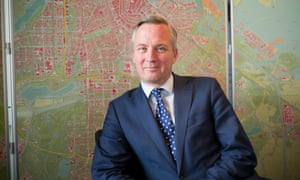
The school, which in 2007 was in the top three in Amsterdam for overweight children, is now one of 100 that are a key focus of the obesity programme. Children are weighed and measured every year. Some parents objected but now it is normal, says Sawat. And so is tap water.
“All children have to bring water or milk to school,” he said. “No juice. A lot of parents were really upset. We had really hard discussions with them.” The parents thought juice or even squash was healthier, assuming they contained fruit. The teachers told them about the sugar. “I told them we were doing them a favour. They could have water at school and then juice at home. Now it’s normal – not a problem.”
The ban on birthday feasts for the class also caused ructions. “It had become competition. Somebody brought cupcakes, so another brought cupcakes and juice and then cupcakes and juice and a toy.” The school produced a folder of healthy treats, such as oranges or carrots decorated to look like faces.
“A few years ago we had a boy who kept going to the bathroom. We found he had Mars and Snickers in his pockets. He was a really fat boy and his parents had put him on a diet but they didn’t tell us,” said Sawat. Now the school is focused on healthy food and even the nearby McDonalds has agreed that a child without a parent can only buy an apple – no fries. A European grant provides one fruit or vegetable for all children for three days a week. The fridge is filled with carrots and radishes, which the children are told they must at least try.
Young children are the focus of most obesity efforts because it is easier to prevent them putting on weight than try to sort it out afterwards. But Dana Bijvoet, a nurse and family adviser working out of a secondary school in the area, picks up with the adolescents. There are about 2,000 morbidly obese children in Amsterdam who are the initial focus.
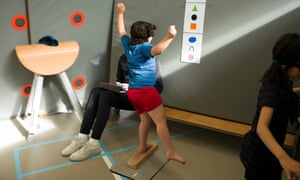
She tells desperately sad stories. Romana, 14, had liver failure because of her weight and was suffering from depression and low self-esteem. Bijvoet talks of dysfunctional families where parents think the child can manage without help, where there is no money and constant crisis. “I want to know how they are in their lives – their psychological health and their self-esteem,” she said. She needs to help with the other problems, “to get a bit of space in their heads to deal with the obesity”.
Romana’s parents, from Suriname, are divorced and her father, who has custody, said the mother was possessed – he told Bijvoet of “a lot of black magic and voodoo”. He was a cab driver, rarely home but would not permit his daughter to go out alone. Asked what she wanted most, Romana said, “I want to fit into my jeans and feel better about myself,” said Bijvoet.
In the east part of the city, where car horns and music announce a Moroccan wedding in the street, a cooking class takes place for children and parents in a community centre. “Every week they come together to cook healthily – to change the traditional recipes,” says Amira El Ashkar, a volunteer whose family was from Egypt. Eight girls and a boy, some of whom are very overweight, are making what they call muffins, which look more like quiche but are made with just egg and oatmeal to bind courgettes, peppers and other vegetables.
El Ashkar has also introduced healthy versions of tagine and couscous dishes. Families want to eat healthy food – they just did not know how, she says.
Eric van der Burg, the deputy mayor for healthcare and sport who launched the programme, was brought up for eight years in the Bijlmer and says he would rather live in those neighbourhoods. “I don’t want to live in an area where everyone is wealthy and they all wear the same clothes and have the same dogs and hairdresser,” he said.
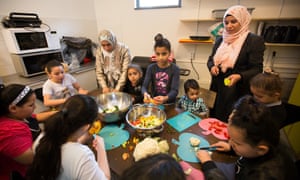
Van der Burg, however, is the nearest Amsterdam has to a rightwinger, belonging to the conservative-liberal People’s Party for Freedom and Democracy (VVD). The rest of the city’s politicians are to the left of him, so there are no accusations of nanny-statism, even though the programme is noticeably interventionist.
He has taken a tough line on advertising at sporting events. The city is the main sponsor of a European basketball championship in July. “We said to the organiser, you can’t have Monster [energy drink] or Burger King as co-sponsor,” he said. The same no-compromise deal is being made with the European hockey and world ice-skating championships. They are talking to restaurants and sports facilities about selling healthier food and banning cola adverts inside stadiums the city owns.
Another important part of the programme is sleep. “It is very important to get enough sleep. Nobody knows that,” says van der Burg.
Programme manager Karen den Hertog says that if you don’t sleep, your hormones are messed up. “You will be extra hungry. It is your hormones talking to you,” she said. They work to organise discussions with parents on children’s sleep patterns through community leaders.
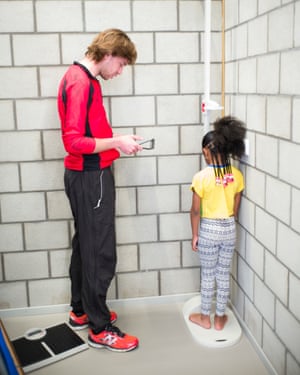
Professor Corinna Hawkes, director of the centre for food policy at City University, who has studied the Amsterdam model, is impressed. “They weren’t just saying let’s have a soda tax – they were thinking about how people connect with their environment,” she said.
“They went to parents and understood their attitudes and engaged in educational programmes to change them,” Hawkes said. “We have to understand why people are making their decisions and adapt accordingly,” she said.
Some of the policies Amsterdam is using to crack obesity
- A ban on bringing juice to focus schools and investment in more water fountains around the city
- Cooking classes to teach healthy varieties of ethnic dishes: pizzas with a broccoli base, kebabs with lean chicken instead of pork, honey and dates substituted for sugar
- City refusal to sponsor any event joint-funded by a fast food company
- Parents encouraged to put small children on bikes without pedals instead of wheeling them in buggies
- Focus on the first 1,000 days of a child’s life, including counselling for pregnant women and mothers
- Families encouraged to eat dinner together
- Sports centre membership and activities subsidised for low-income families
[Source:-theguardian]



